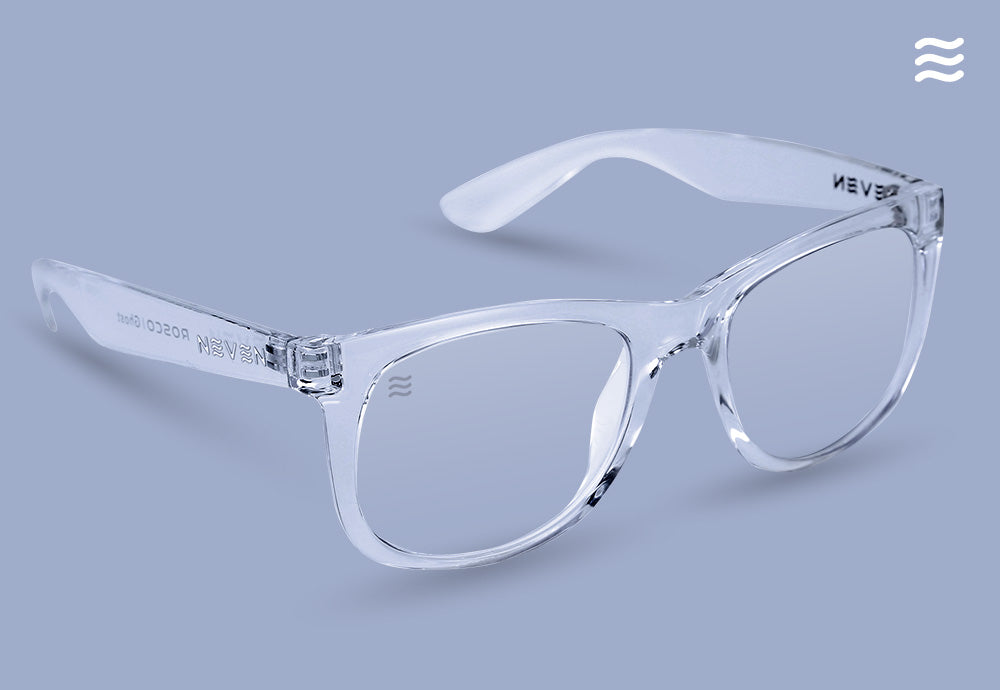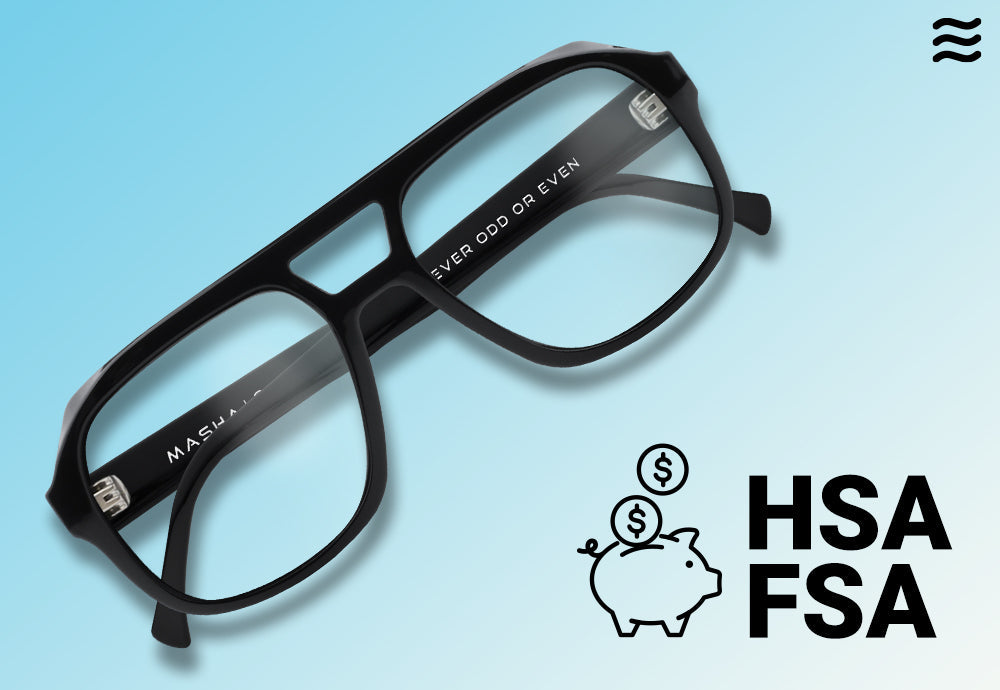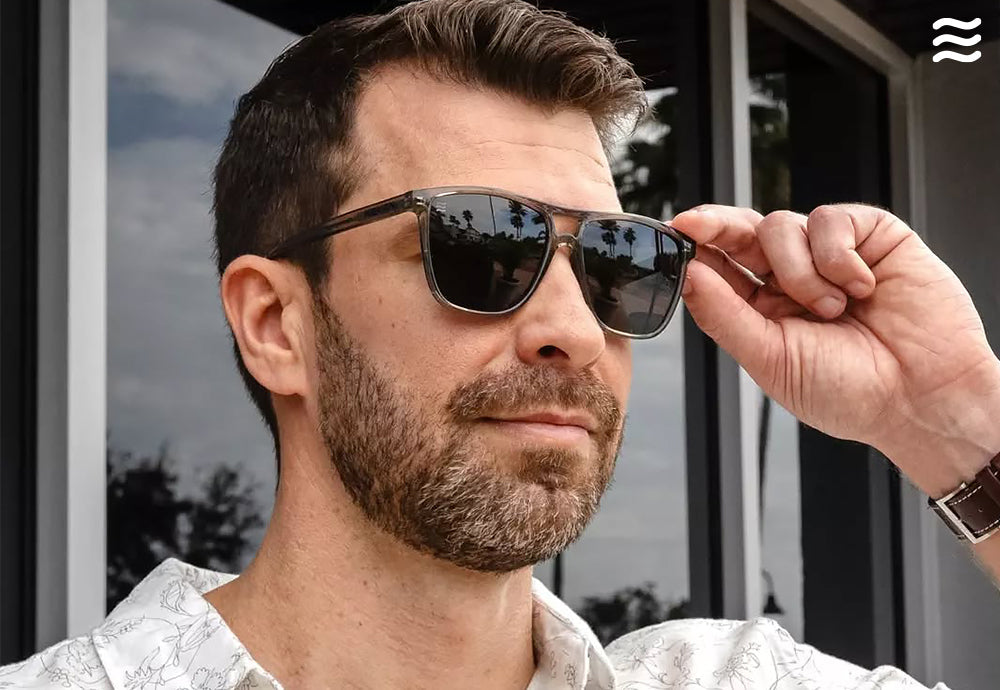
Blue light glasses have become a go-to for many people dealing with tired eyes, headaches, or blurry vision after long hours looking at screens or in the sun. The sun gives off the most blue light, but LEDs, fluorescent bulbs, and digital devices also produce it in smaller amounts. Many try to cut back on this exposure, especially at night, to avoid eye strain, poor sleep, and fatigue.
The idea is that lenses with blue light filters can protect the eyes and improve sleep by blocking certain wavelengths during both daytime and nighttime. Some believe this can ease symptoms and limit possible harm. With so many products making big promises, it helps to look at what the research actually says. This guide explains how blue light affects the eyes, how blue light glasses work, and what science says about it.
What Is Blue Light and How Does It Affect Eye Health?
Blue light is a type of high-energy visible light (HEV) with wavelengths between 400 and 500 nanometers. It falls within the short wavelengths of the visible spectrum, meaning it’s higher in energy and can have a bigger effect on your eyes. You’ll find it on the short-wavelength, high-frequency end of the visible light spectrum.
Main Sources of Blue Light
We’re surrounded by blue light every single day. The most powerful source is the sun. Natural blue light is far more intense than anything manmade. But there’s also artificial blue light, which comes from devices and lighting we use constantly. Digital screens, LED lights, and fluorescent lights all give off blue light.
The rise in screen time means many of us spend hours looking at artificial blue light at close range. Natural blue light helps keep us alert during the day and supports our circadian rhythms. However, too much artificial blue light, especially in the evening, can have a different effect on the eyes and body.
Natural vs Artificial Blue Light
Blue light from your phone or laptop is nowhere near as strong as what comes from sunlight. Scientific American has highlighted that natural blue light can be hundreds of times more intense than digital blue light.
Still, plenty of people use blue light blocking glasses to filter out artificial blue light during the day and reduce exposure at night. The thinking is that blue light filters or blue light filtering lenses can lower the amount of light hitting your eyes, ease discomfort, and possibly help long-term eye health.
That said, the sun’s natural blue light is the heavyweight champion here. So if you’re outdoors, sunglasses are a smart choice; they reduce glare, keep your vision comfortable, and protect you from the much stronger natural blue light.
Dangers and Long-Term Risks of Blue Light Exposure
One of the biggest concerns is how blue light at night can disrupt sleep. It suppresses melatonin, the hormone that makes you feel ready for bed. Reducing blue light exposure in the evening can help you fall asleep faster, stay asleep longer, and improve overall sleep quality. Blue light glasses can block short-wavelength light and stop it from reaching your eyes, which may also ease strain.
Another worry is the potential link between long-term blue light exposure and age-related macular degeneration (AMD). Some studies suggest that overexposure could contribute to retinal damage, especially if other risk factors are involved. While there’s no solid clinical proof yet that blue light directly causes permanent damage, it’s an area that researchers are watching closely.
Symptoms Linked to Blue Light Issues
Here are some tell-tale signs of over-exposure to blue light:
Digital Eye Strain (Computer Vision Syndrome)
Many people who think they have “blue light fatigue” are actually dealing with digital eye strain, also called computer vision syndrome. It’s extremely common, affecting 70% to 90% of people who spend long hours in front of screens. This includes office workers, remote staff, gamers, students, and anyone using digital devices for more than a couple of hours a day.
Common symptoms include:
-
Dry, irritated eyes
-
Blurred or double vision
-
Headaches
-
Neck or shoulder pain
-
Trouble refocusing after screen use
Blue Light Sensitivity and Migraines
For some people, short-wavelength light in the blue range (415–450 nm) can trigger discomfort. This is common in those with migraines, post-concussion symptoms, or certain neurological conditions. Research and anecdotal reports suggest that blue-light-blocking glasses or lenses can reduce this type of light-triggered discomfort, especially from LED lights and digital screens.
Some specialized lenses go further and block amber or red light too, which can also worsen symptoms in sensitive individuals.

How Do Blue Light-Blocking Glasses Work?
Let’s break down how blue light glasses work, because not all of them are built the same.
These glasses use a special lens coating or a built-in blue light filter that targets wavelengths in the 415 to 450 nanometer range. This is the band of short-wavelength light often associated with melatonin suppression and some glare issues from light-emitting diodes.
Some blue light filtering glasses are clear and look just like regular eyewear. Others have a slight yellow or amber tint, especially models designed for nighttime use or for people with light sensitivity. The tint helps absorb more HEV light, but it can also slightly alter color perception.
Now here’s the thing: quality varies a lot. Cheap glasses from random marketplaces might only block 5–10% of blue light. More reliable brands, such as Neven Eyewear, block more light, depending on the lens design. Some models also come with anti-reflective coatings that help reduce glare, especially in bright rooms or under fluorescent lighting.
If you’re wearing blue light glasses all day, that’s totally safe. They don’t interfere with your vision, and they don’t hurt your eyes over time. There’s no downside to wearing blue light filtering lenses daily if you find them helpful.
They won’t correct visual acuity or fix medical issues, but they might help you feel more comfortable during long screen time sessions or when using electronic devices at night. Just make sure you’re getting a pair that’s been tested to actually filter blue light in the right range.
Why Choose Neven Eyewear for Eye Strain Relief
At Neven Eyewear, we provide comfort and clarity for people dealing with eye strain, light sensitivity, and too much artificial blue light. Our blue light filtering lenses are comfortable to wear all day long, so your eyes stay protected.
Unlike other options that only filter 5–10% of light, our blue-blocking lenses block more light without distorting color too much. Our glasses feature durable materials and lightweight frames that remain comfortable, even when you're staring at a computer screen all day.
We also offer an anti-reflective coating option, which can be added to prescription lenses. This special coating acts as a shield from glare, minimizing reflections from screens, headlights, and harsh indoor lighting. Pair it with blue light filtering lenses, and it can make your eyes feel more comfortable and less tired. It's great for driving at night, long hours in front of a screen, or if bright lights easily bother you.

People Choose Neven Eyewear Because:
-
Big reduction in screen glare and reflection
-
Frames made for long screen time
-
Stylish, works with or without a prescription
-
Trusted by real users
-
Hassle-free returns + satisfaction guarantee
Frequently Asked Questions
Do Blue Light Glasses Help With Eye Strain?
If you’re dealing with eye fatigue, computer use, or extended screen time, wearing blue light glasses may help reduce symptoms like dryness, strain, and glare.
Can Blue Light Glasses Improve Sleep Quality?
Yes, for many users, especially healthy adults exposed to electronic devices before bed. By filtering short-wavelength light that delays melatonin, blue-blocking glasses can help fall asleep faster and may improve sleep quality, though not every study agrees (some use actigraphy-derived sleep parameters to measure results).
Are Blue Light Glasses Worth Buying?
If you're light sensitive, work under fluorescent lights, or have sleep issues, they’re definitely worth trying. This is because many people report a significant difference, particularly those with age-related macular degeneration risks or diagnosed sleep disorders.
Do Eye Doctors Recommend Blue Light Glasses?
Some do, especially for people with visual stress or those on a night shift. Others say frequent breaks, artificial tears, and checking your visual acuity should come first. Still, a few support them as an additive treatment for people with bipolar disorder due to their link with melatonin and light exposure (source: American Journal of Psychiatry).
Final Thoughts on Blue Light Glasses
Wearing blue light glasses won’t fix every issue, but they may help if you're light sensitive, suffer from sleep disorders, or want to limit glare from LED lights and electronic devices. These glasses block short-wavelength light, which might protect long-term eye health. But don’t skip the basics: blink often, lower screen glare, adjust lighting, and take frequent breaks. If your screen time is high, these habits matter more than any pair of blue light filtering glasses.
Still, many people find huge benefits from blue light glasses. And there’s a reason Neven’s options are so loved! Our blue light filtering lenses help reduce light exposure, feel great to wear, and are designed with both style and function in mind. Whether it’s computer use, gaming, or working under fluorescent lights, we’re here to help you stay comfortable, and maybe even sleep better, too.
Looking for something else? If you want protection and a classic, stylish look, our round sunglasses combine proven glare reduction with a design that never goes out of style. Ladies - looking for designs that give you fashion with function? See our sunglasses for women collection. They protect your eyes while complementing your personal style. Need a sharp, modern frame that’s comfortable for long days? Browse our rectangle sunglasses for sleek style and dependable eye protection outdoors.

































































